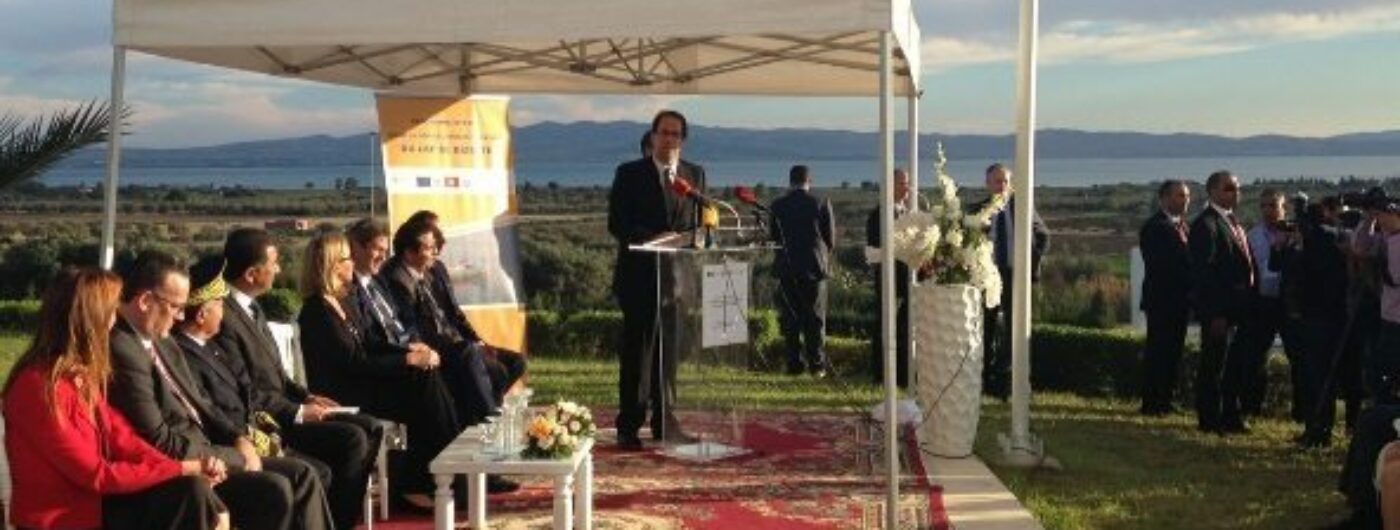
EU, UfM, EIB and EBRD launch project for the environmental clean-up of Lake Bizerte and the depollution of the Mediterranean
Bizerte, Tunisia, 1 November, 2016. With a total budget of more than €90 million over a 5-year period, the programme will contribute towards cleaning up Lake Bizerte in northern Tunisia, improving the living conditions of the surrounding populations and reducing the main sources of pollution impacting the entire Mediterranean Sea.
As emphasized by the High Representative, Ms Federica Mogherini: “This is a great example of how fighting pollution and protecting the environment can contribute to more sustainable and inclusive socio-economic growth, providing new opportunities for young people in the region in sectors such as fishing, ecotourism, agriculture, industry and aquaculture”.
Implemented by the Tunisian Ministry of Local Affairs and the Environment, the programme will help to rehabilitate the entire area with the aim of encouraging sustainable development. Furthermore, it will improve the health and quality of life of the inhabitants and facilitate the socio-economic development of the region.
As well as being integrated into the Euro-Mediterranean Horizon 2020 Initiative for a cleaner Mediterranean Sea, the project is one of the first large-scale infrastructure programmes labelled by the Union for the Mediterranean (UfM) to be underway.
UfM Secretary General Fathallah Sijilmassi highlighted the regional impact of the project: “This flagship initiative represents a success story as regards the cooperative efforts undertaken in the Euro-Mediterranean region in order to achieve further integration and stability. Implementing this initiative will directly improve the living conditions of around 500,000 people and its positive effects will be felt by millions of citizens, thanks to the Mediterranean Sea clean-up operation. The project will also create new SMEs and job opportunities for young people, which will contribute towards our region’s socio-economic development and stability”.
Courtesy of the Tunisian government
The project is an example of how international donors are coordinating and complementing each other’s efforts, as it benefits from the support of two major financial institutions and the European Union, all of which represents a particularly interesting way of mixing loans and donations that total around €90 million.
As the project’s main donor, the European Investment Bank (EIB) – the European Union’s bank – has supported the programme from the outset and is granting a loan of €40 million. This will mainly be used for the environmental modernisation of the three largest industrial plants near the lake, and more specifically, will include the treatment of industrial liquid waste, air emissions and solid waste. In addition to the EIB loan, the European Union has agreed to provide a €15 million grant for both capital expenditure and technical assistance thanks to the Neighbourhood Investment Facility. The European Bank for Reconstruction and Development (EBRD) is granting a €20 million loan to the National Sanitation Utility (ONAS) and technical assistance worth €2 million, financed by the Global Environment Facility (GEF), to support the expansion and rehabilitation of the sewerage network of the Bizerte region as well as the rehabilitation of three wastewater treatment plants near the lake. Aside from a contribution by the Tunisian Government (worth €16 million), the synergy created will thus allow for the development of other complex projects like the Bizerte project.
The Integrated Programme for the Protection of the Lake Bizerte against Pollution is a part of Tunisia’s global development strategy. It is being launched just a few days away from the International Conference in support of economic, social and sustainable development in Tunisia, Tunisia 2020, as a confirmation of the international community’s support for Tunisia. The Union for the Mediterranean will continue to deepen its rich and comprehensive partnership with Tunisia as part of its efforts to strengthening regional cooperation in the Mediterranean.
For further information
Factsheet: “Integrated Programme for the Protection of Lake Bizerte against Pollution”

